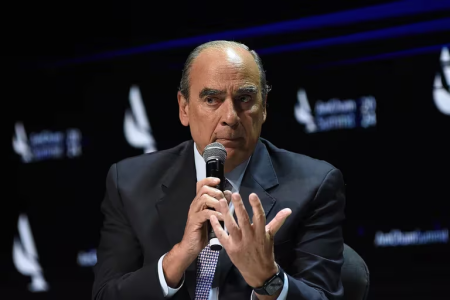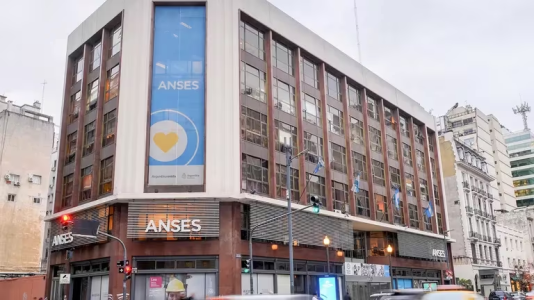All the Answers
Well-known member
The Government proposes to increase pensions due to inflation and grant an additional 10% increase - Infobae

Source:

El Gobierno propone aumentar las jubilaciones por inflación y otorgar un 10% de incremento adicional
En medio de la pulseada con la oposición, el ministro del Interior, Guillermo Francos reconoció que está bajo estudio una metodología alternativa para el incremento de los haberes
March 13, 2024
In the midst of the fight with the opposition, the Minister of the Interior, Guillermo Francos, acknowledged that an alternative methodology for increasing salaries is under study.

Guillermo Francos propone una nueva formula jubilatoria
Guillermo Francos discute sobre una nueva fórmula para ajustar las jubilaciones
cdn.jwplayer.com
The Minister of the Interior, Guillermo Francos, proposed a new formula to adjust retirements
The Government proposes to include an additional 10% increase to compensate for inflation in the first quarter for retirees, and apply a new retirement formula that would apply from April. This was stated by the Minister of the Interior, Guillermo Francos , in the midst of the struggle with the opposition blocks that demand in the Chamber of Deputies to deal with a new automatic update of assets .
The official in charge of political relations with the provinces acknowledged that “there are legislators who want to change the retirement formula because it does not adjust to the real situation of the economy.” And that " the Government is going to propose a change so that it is adjusted by the Consumer Price Index (CPI) ."
However, Francos pointed out that what is under discussion is “the decoupling of a period that must be considered .” “This formula is applied quarterly and that period now expires in March. If that formula could come out now, the Government's proposal is to add 10% more to the corresponding adjustment , and from the following month to adjust for the CPI,” he said in statements to Radio Rivadavia .
The truth is that the minister did not clarify if that 10% includes additional bonuses . Nor if the mobility since April also covers the bonuses that pensioners with lower salaries have been receiving, or if they are incorporated into the salaries, in such a way that it covers the bonus and the entire income is considered for mobility.

"The Government's proposal is to add 10% more to the corresponding adjustment, and from the following month to adjust for the CPI," said Francos (Nicolás Stulberg).
In this way, the connection between the formula of the previous Government, which would be in force until the end of March, and the one that would govern from April 1 would contemplate, in the official version, little less than the inflation of January 2024, which was 20.6%, according to the National Institute of Statistics and Census (INDEC). And going forward there would be no recovery for the loss of recent years . Nor does a recovery improve real wages or the economy.
The opposition projects propose granting in April all of January's inflation and mobility from April according to the CPI measurement from 2 months before. That is, in April, the inflation of February. But they also do not clarify what treatment the bonds would have and there would be no recovery for what was lost in recent years.
As a counterproposal, according to Francos, the Executive Branch is in a position to agree on a new mobility formula that adjusts for inflation starting in April, recognizing only 10% backwards as compensation for the quarter.

CONSIDERED
With the 27.18% increase and the bonus of up to $70,000, minimum wage retirements and pensions are collecting $204,445 gross. The total breaks down to $134,445 plus $70,000.
Then, in April the 10% and the February CPI would be applied, but Minister Franco did not clarify whether these increases will be applied to the $134,445 or $204,445 gross.
Retirees and pensioners with salaries greater than $204,445 will receive the 27.18% increase before the end of the month and will not receive any bonus.
The official intention to change the pension regime
In addition to the change in the formula, the Government expressed its intention to reform the system as a whole . Francos and President Javier Milei himself implied this in several interviews, when questioning whether those beneficiaries who entered due to a moratorium in previous administrations and did not have the contributions required by law receive the equivalent of a minimum retirement.“Everyone knows the problem with the Argentine retirement system: it is totally underfunded . Of every $100 pesos paid in retirement, only $55 comes from active workers. The rest are specific taxes that were established to cover this gap and the remaining 15% comes from the National Treasury. This system must be changed; What has happened of the 6 million, there are 3 million who made their contributions and 3.6 million who did not. It is very complex to resolve in a single moment,” said the Minister of the Interior.
“We will try to take a position that is fair and sustainable for the State. We must differentiate between those who contributed and those who did not contribute to have a special retirement ,” Francos concluded.

According to a report released by IDESA, retirements would lose up to 41% if inflation in the first quarter is considered.
The historic loss of pensions
A report released by IDESA, a think tank whose one of its founding partners is Osvaldo Giordano , the dismissed director of the ANSeS, points out that in relation to the last 30 years “according to official information, and assuming inflation of 15% and 10% for February and March respectively” in March all retirement bands will be below the historical average of 1995-2024.According to these estimates, the minimum asset of $134,445 would have a drop of 41% according to that historical record; The minimum asset plus the bonus ( $204,445 ) would reach 14% below , while the average asset of retirees who did not use the moratoriums is $299,407 and would reach 29% below the historical average.
*With information from the NA agency.

